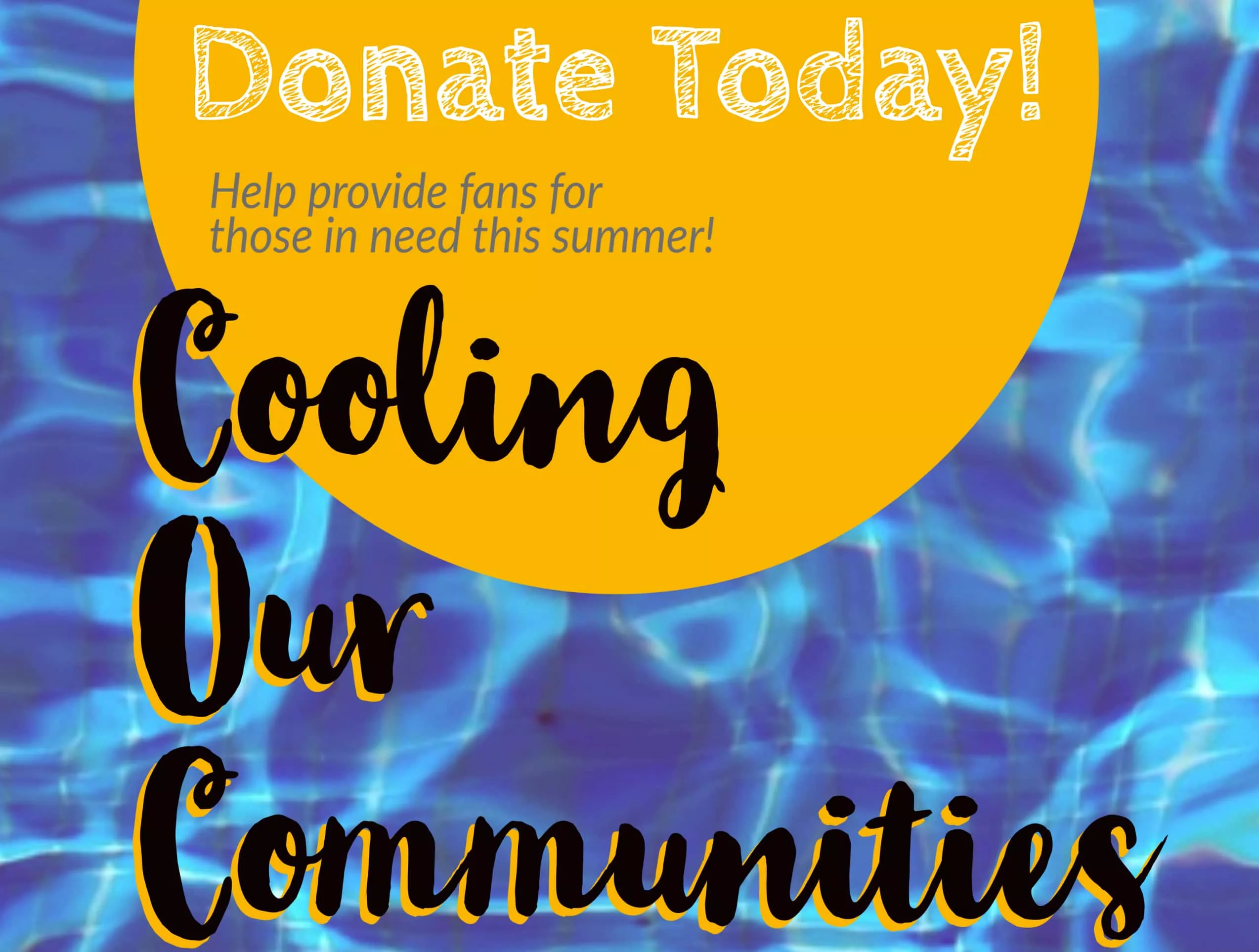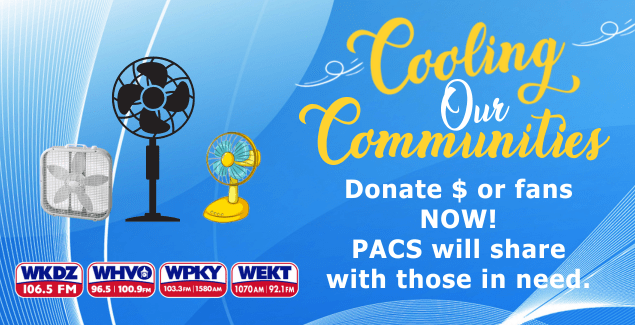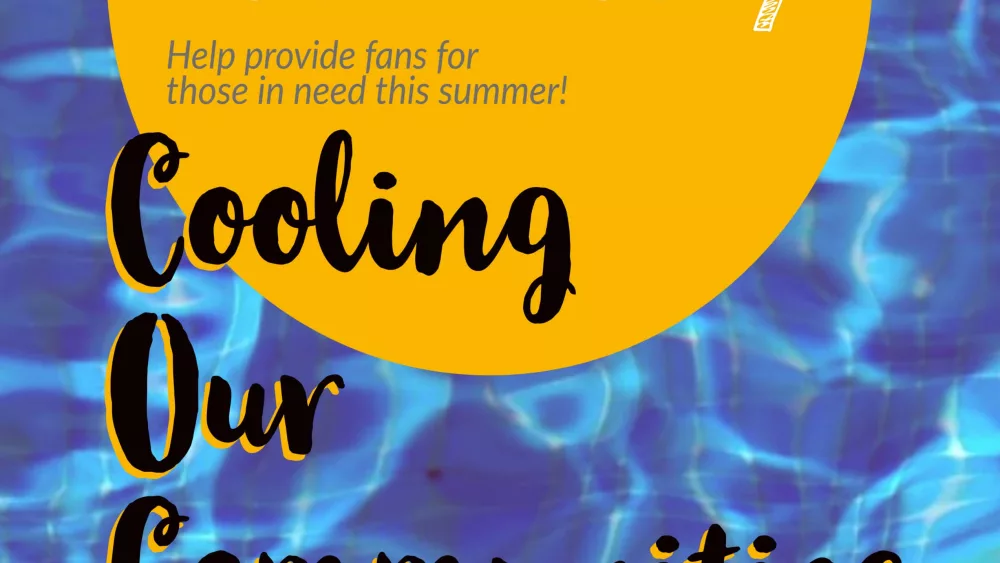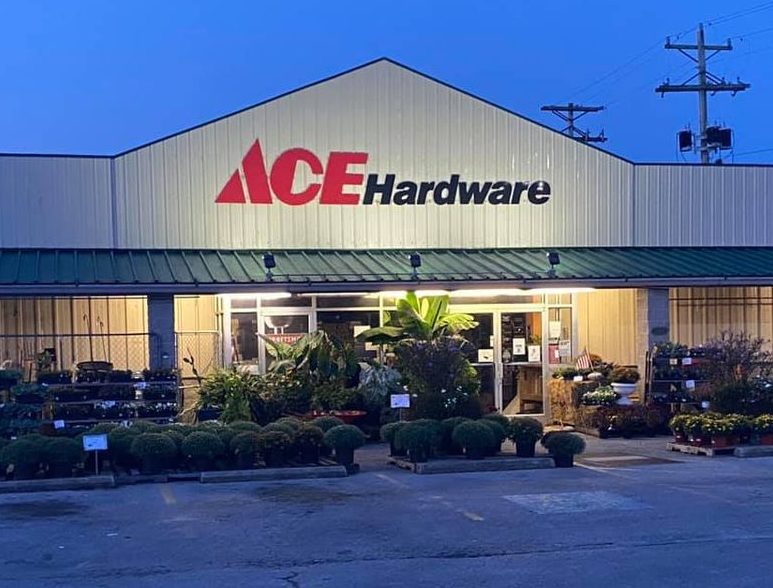

Our area typically has some very hot weather over the Summer months. The dangers of over-exposure to heat can cause many different problems, especially for the elderly. WKDZ, WHVO, WEKT, and WPKY have partnered with PACS (Pennyrile Allied Community Services) to help make it easier for the elderly to stay cool in the hot summer months. PACS serves the nine surrounding counties of Caldwell, Christian, Crittenden, Hopkins, Livingston, Lyon, Muhlenberg, Todd, and Trigg. Together we can provide fans for those who are identified with needs throughout all these communities!
How can you help?
Donate either money or fans this month to be distributed during the Summer.
To purchase and leave a fan, please visit Cadiz Ace Hardware.
You can also stop by the WKDZ/WHVO studios at 19 DJ Everett Drive. Tune in June 7th during the morning shows on 106.5, 100.9 and 96.5 for more details and updates.
Mark your calendars for the BIG grand FAN-ale on June 28th, 3-5PM on WKDZ.
A BIG thank you to all of our sponsors! Find out more about them.
PURCHASE AND LEAVE LOCATIONS:
Cadiz Ace Hardware –1654 Main St, Cadiz
Donate Money or Fans:

Pennyroyal Hospice Inc –220 Burley Avenue, Hopkinsville KY
Thank you to everyone for their support! Let’s make this Summer a cooler time for all.
Educate yourself and be ready for Summer.
Here are a few hot weather tips courtesy of Care.com
- Stay Hydrated
Seniors are more susceptible to dehydration than younger people because they lose their ability to conserve water as they age. They also can become less aware of their thirst and have difficulty adjusting to temperature changes. Remember to drink water often, and be sure to pack some for those long summer drives. - Talk to Your Doctor
Check with your medical team to make sure any medications you are on won’t be affected by higher temperatures — especially if you don’t have air conditioning in your home. Some medications are less effective if stored at temperatures higher than room temperature (approximately 78 degrees Fahrenheit), and the last thing anyone wants is for a preventable medical condition to become aggravated due to high temperatures.
- Keep Your Cool
Even small increases in temperature can shorten the life expectancy for seniors who are coping with chronic medical conditions. Shopping malls, movie theaters and libraries provide welcome, cool spaces if a senior’s own home isn’t air conditioned. - Stay in Touch
High temperatures can be life-threatening, so communication plays an important role in ensuring the safety of the elderly. For seniors, you should let friends and family know if you’ll be spending an extended period of time outdoors, even if you’re only gardening. - Meet Your Neighbors
Get in touch with those who live in your neighborhood and learn a bit about them and their schedules. If you are elderly, see if a younger neighbor — perhaps even one of their kids — can come by and check on you occasionally to make sure everything is all right. - Know Who to Call
Prepare a list of emergency phone numbers and place them in an easy-to-access area. This way, the right people can be called to help quickly prevent any further issues or prevent medical problems from getting worse. - Wear the Right Stuff
Everyone, including seniors, should dress for the weather. When it’s warm out, some people find natural fabrics (such as cotton) to be cooler than synthetic fibers. Stock your summer wardrobe with light-colored and loose-fitting clothes to help feel cooler and more comfortable. - Protect Your Eyes
Vision loss can be common among the elderly, and too much exposure to the sun can irritate eyes and cause further damage. Wearing sunglasses can protect your eyes from harmful UV rays and preserve your vision. - Know the Risks of Hyperthermia
During the summer, be particularly cautious about abnormally high body temperatures — a condition known as hyperthermia. Heat stroke is an advanced form of hyperthermia that can be life-threatening. Make sure to know the warning signs and get medical attention immediately if you or anyone you know is experiencing these symptoms:
o Body temperature greater than 104 degrees
o A change in behaviour, such as acting confused, agitated or grouchy
o Dry, flushed skin
o Nausea and vomiting
o Headache
o Heavy breathing or a rapid pulse
o Not sweating, even if it’s hot out
o Fainting - Rub on Sunscreen and Wear Hats
Everyone, young and old, should wear sunscreen when outdoors. The elderly especially need extra sun protection to help keep them healthy. Hats are also a great idea, especially for those with light-colored hair and those with only distant memories of a full head of hair. - Apply Bug Spray
The elderly is particularly prone to West Nile Virus and encephalitis. If you live in areas where there are a lot of mosquitoes and where West Nile Virus is present, and if you spend a lot of time outdoors (particularly at night), use mosquito repellent to help reduce the risk of getting bit by a mosquito carrying this virus. - Exercise Smart
If you enjoy outdoor activities such as walking or gardening, make sure to wear the proper clothing and protective gear. It is also important to keep track of time. Do not stay out for long periods and make sure to drink even more water than usual when exercising. Also consider getting outdoor exercise earlier in the morning or later in the evening when the sun is not at its peak.








